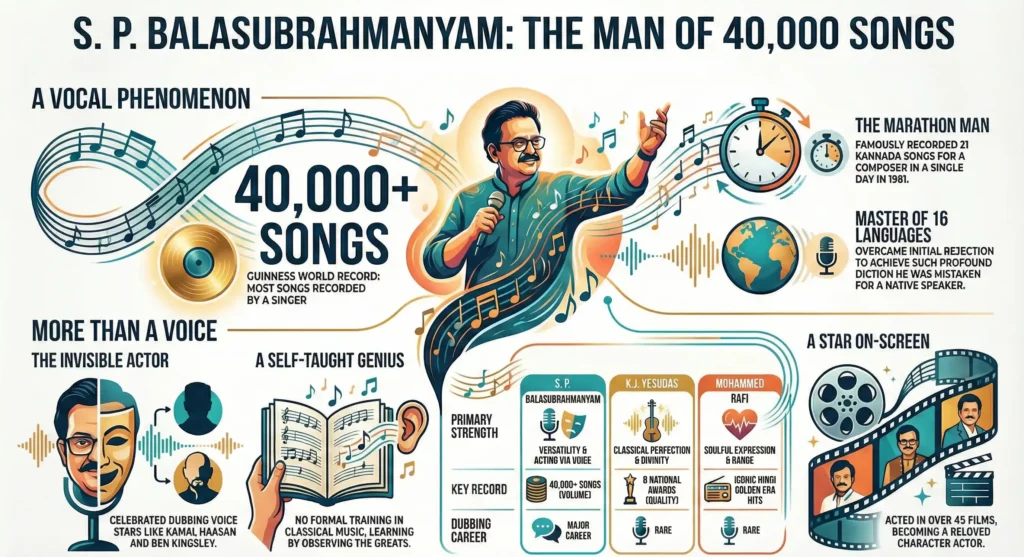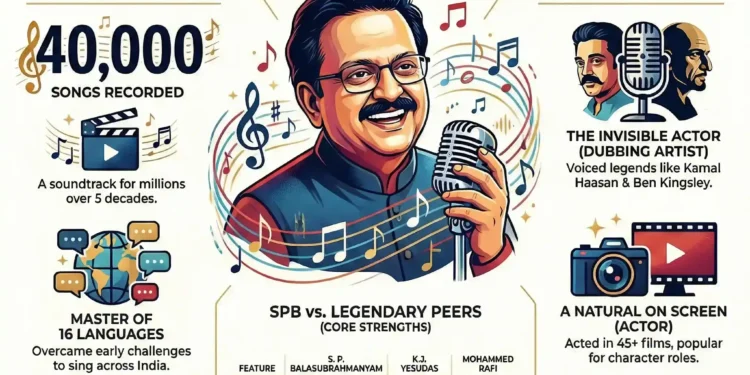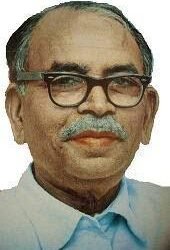S. P. Balasubrahmanyam (S. P. Balasubrahmanyam biography) was not just a singer; he was a phenomenon who reshaped the auditory landscape of Indian cinema. This article delves into the life of "Paadum Nila" (Singing Moon), tracing his journey from an engineering dropout to a Guinness World Record holder with over 40,000 songs. We examine his profound friendship with Ilaiyaraaja, his lesser-known dominance as a dubbing artist for stars like Kamal Haasan and Salman Khan, and the sheer stamina that allowed him to record 21 songs in a single day. This is a tribute to the voice that bridged languages and generations.| Category | Details |
| Full Name | Sripathi Panditaradhyula Balasubrahmanyam |
| Nickname | SPB, Balu, Paadum Nila |
| Born | June 4, 1946 (Nellore, Madras Presidency) |
| Died | September 25, 2020 (Chennai) |
| Primary Profession | Playback Singer, Music Director, Actor, Dubbing Artist |
| Key Achievement | Guinness World Record for recording over 40,000 songs |
| Languages | 16 (including Telugu, Tamil, Kannada, Hindi, Malayalam) |
| National Awards | 6 National Film Awards for Best Male Playback Singer |

S. P. Balasubrahmanyam Biography: The Voice of 40,000 Souls
There is a mystery in numbers. When we hear that a single human being recorded over 40,000 songs, the mind struggles to comprehend the logistics, let alone the artistry. How does one man live enough life to breathe soul into forty thousand different emotions?
The story of S. P. Balasubrahmanyam is not merely a chronicle of hits; it is a study in human potential. For over five decades, SPB didn’t just sing for actors; he became them. Whether he was channeling the youthful exuberance of Salman Khan in Maine Pyar Kiya or the sagely wisdom of Kamal Haasan in Sagara Sangamam, Balu, as he was affectionately known, possessed a chameleon-like vocal cord that remains unmatched in Indian cinema history.
6 Unfoldings in the Subrahmanyan Chandrasekhar Biography
The Engineering Dropout Who Engineered Music
Long before the awards and the accolades, young Balasubrahmanyam was a student at JNTU College of Engineering, destined for a conventional life. But destiny had a different rhythm in mind. A severe case of typhoid forced him to discontinue his studies, a twist of fate that led him closer to his true calling.
It is a lesser-known fact that SPB was self-taught. He had no formal training in classical music when he began. His “guru” was his observation. He would listen to the greats and mimic their nuances. His first break came in 1966 with the Telugu film Sri Sri Sri Maryada Ramanna, but the road wasn’t paved with instant gold. He faced rejection, with composers often telling him he couldn’t pronounce words correctly in languages other than Telugu.
Yet, he conquered 16 languages. His mastery over Tamil diction became so profound that he was often mistaken for a native Tamilian. This determination to learn is the first clue to his longevity.
The Ilaiyaraaja Connection: A Symphony of Friendship
No S. P. Balasubrahmanyam biography is complete without mentioning Ilaiyaraaja. Their bond predates their fame. In the dusty streets of Chennai, before the world knew them, SPB would sing in light music troupes while a young man named Rasaiya (Ilaiyaraaja) accompanied him on the harmonium and guitar.
They were brothers in arms. When Ilaiyaraaja finally broke into the industry, SPB became his voice. Together, they defined the sound of the 80s and 90s.
- The 90s Magic: Songs like Ilaya Nila (from Payanangal Mudivathillai) showcased how Ilaiyaraaja utilized SPB’s breath control to create magic. The song famously features no gasps for air, a technique SPB mastered to perfection.
However, their relationship wasn’t without friction. They had a famous fallout over royalty issues later in life, a human moment that reminded us that even legends grapple with professional complexities. Fortunately, the two reconciled, proving that their musical soul connection was stronger than legal notices.
10 Remarkable Facts About Meghnad Saha Life and Achievements
The Marathon Man: Breaking the Guinness Record
The centerpiece of the SPB legend is his Guinness World Record. But numbers on a page don’t convey the physical reality of this feat.
- The Kannada Marathon: On February 8, 1981, SPB walked into a studio in Bangalore and recorded 21 songs in Kannada for composer Upendra Kumar. This wasn’t just singing; it was an athletic performance.
- Multilingual Stamina: He also held records for recording 19 Tamil songs in a day and 16 Hindi songs in a day.
He would often record a song in Chennai in the morning, fly to Mumbai for a Hindi track, and return to Hyderabad for a Telugu recording by night. He lived in airports and recording booths, fueled by little more than tea and passion.
The Dubbing Artist: The Invisible Actor
While his singing is celebrated, his contribution as a dubbing artist is the hidden gem of his career. SPB was the voice of Kamal Haasan for the Telugu versions of his films for decades. He captured Kamal’s sighs, laughs, and cries so perfectly that Telugu audiences often couldn’t believe it wasn’t Kamal speaking.
He also dubbed for Ben Kingsley in the Telugu version of Gandhi. Think about that range: from the romantic hero of Ek Duuje Ke Liye to the father of the nation. This ability to “act” with his voice is what separated SPB from his contemporaries. He didn’t just hit notes; he played characters.
The Final Bow
In September 2020, the music paused. SPB’s battle with COVID-19 complications brought an end to an era. His passing was not just a loss for the industry but a personal loss for millions who grew up with his voice as the soundtrack to their first loves, their heartbreaks, and their triumphs.
His legacy is not just the 40,000 songs, but the warmth he brought to them. He proved that a singer doesn’t need to be classically trained to be a legend; they just need to be relentlessly, passionately human.
7 Incredible Facts in the Satyendra Nath Bose Biography
Quick Comparison: SPB vs. Contemporaries
| Feature | S. P. Balasubrahmanyam | K.J. Yesudas | Mohammed Rafi |
| Primary Strength | Versatility & Acting via Voice | Classical Perfection & Divinity | Soulful Expression & Range |
| Key Record | 40,000+ Songs (Volume) | 8 National Awards (Quality) | Iconic Hindi Golden Era Hits |
| Acting Career | Extensive (45+ films) | Limited | Limited |
| Dubbing | Major Career (Kamal, Salman) | Rare | Rare |
Curious Indian: Fast Facts
- The Acting Debut: SPB wasn’t just a voice; he was a beloved actor. He acted in over 45 films, with his role in Kadhalan (as the cool father) earning him massive popularity among the youth.
- The Frozen Voice: During the recording of the song “Tere Mere Beech Mein” for Ek Duuje Ke Liye, SPB drank ice-cold water to give his voice a specific texture needed for the pathos in the song.
- Rejection Turned Victory: Early in his career, he was rejected by a composer who said his voice was “not manly enough.” That same voice went on to define masculinity for stars like Rajinikanth and Salman Khan.
- The Composer: He composed music for over 45 films, including the Telugu blockbuster Mayuri.
Conclusion
S. P. Balasubrahmanyam’s life is a testament to the power of passion over pedigree. He taught us that boundaries of language are easily dissolved by melody. His S. P. Balasubrahmanyam biography reads less like a career and more like a mythological tale of a man who was sent to earth simply to sing. As we listen to his tracks today, from the high-energy “O Podu” to the soulful “Mannil Indha”, we realize that while the singer may have left the booth, the song will never end.
8 Fascinating Facts in the Homi Jehangir Bhabha Biography
If you think you have remembered everything about this topic take this QUIZ
Results
#1. Approximately how many songs is S. P. Balasubrahmanyam estimated to have recorded in his career?
#2. Before pursuing music full-time, what was SPB studying at JNTU College?
#3. What was unique about SPB’s musical training?
#4. Which legendary composer accompanied SPB on the harmonium in their early days before fame?
#5. In which language did SPB set a record by recording 21 songs in a single day?
#6. For which actor was SPB the primary dubbing voice in Telugu versions of their films for decades?
#7. In which film did SPB gain massive popularity for acting as the “cool father”?
#8. What reason was given by a composer for rejecting SPB early in his career?
8 Remarkable Secrets in the Jagadish Chandra Bose Biography
How many songs did S. P. Balasubrahmanyam sing in total?
SPB is credited with recording over 40,000 songs in 16 Indian languages, a feat recognized by the Guinness World Records.
Which actor did SPB dub for most frequently?
He was the permanent Telugu dubbing voice for Kamal Haasan for decades. He also dubbed for Rajinikanth, Salman Khan, and Anil Kapoor in various dubbed versions of their films.
Did S. P. Balasubrahmanyam win a National Award for Hindi songs?
Yes, he won a National Film Award for Best Male Playback Singer for the song “Tere Mere Beech Mein” from the Hindi film Ek Duuje Ke Liye (1981).
Was SPB classically trained?
Surprisingly, no. SPB did not have formal training in Carnatic music when he started his career. He learned by listening and through his association with composers like K.V. Mahadevan and Ilaiyaraaja.
What was the cause of SPB’s death?
S. P. Balasubrahmanyam passed away on September 25, 2020, due to cardio-respiratory arrest following complications from COVID-19.
Read More: https://curiousindian.in/devika-rani-march-1908-march-1994/








